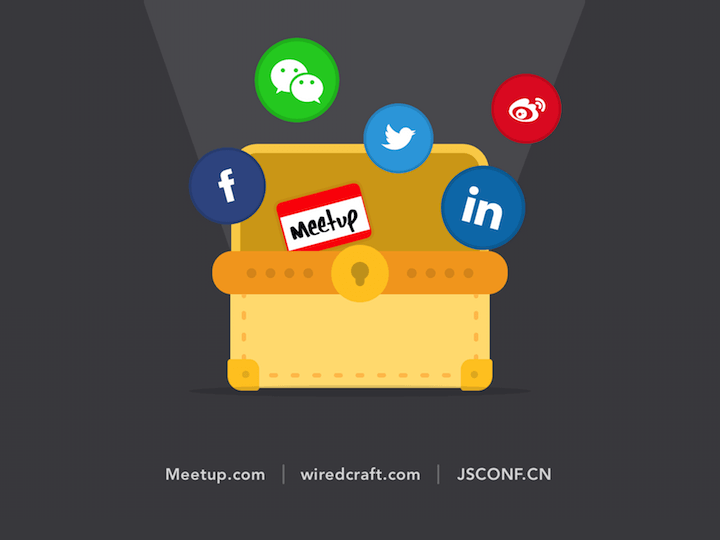4 Weeks to a Successful Meetup

You’ve gone to a few Meetup events and you’ve networked around at some of them, but you’re interested in more. What you really want is to contribute to the design or JavaScript communities in your area, but you’re nervous about hosting an event yourself.
Don’t fear, Wiredcraft is here.
We host monthly meetups in Shanghai for the JavaScript, Design, and Ansible communities, and we’re here to share our meetup-hosting best practices.
So, log into Meetup.com, grow your list, and get started. (Pro tip: If you click “Make a Meetup” and then don’t create one immediately, Meetup.com will offer you discounts the next day.)
Why host a Meetup?
Make sure you have a clear focus for why you want to host the meetup. Don’t let it get too sales-y; this should be a chance for networking and personal and career growth.
- Recruitment. Jack Daly, an entrepreneur, sales guru, and author of Hyper Sales Growth, says “Recruiting is a process, not an event. It must be ongoing and continuous.” (Side note: if you haven’t read his book, pick it up; it’s got great insights for anyone in your business.) How will you know who you want to hire if you don’t have the opportunity to meet them? Meetups facilitate relationship-building within communities, which will keep recruitment in your community ongoing and continuous.
- Your staff gets a chance to shine. They can become leaders within their communities, build their networks, and develop their careers. Your staff can be mentors, find mentors, or gradually become mentors. In the end, having an active presence in your community shows that you care.
- Build your brand. Hosting events is a great opportunity to market your brand. You have a unique opportunity to reach out to people in your workspace and connect (in person) to build relationships for business development and recruitment.
What’s in your toolbox?

- Meetup.com
- Website for your Meetup
- Twitter, Facebook, and Linkedin (and Wechat and Weibo for us folks here in China)
- Your company blog and newsletter (sponsor’s blogs)
Week by Week Best Practices for organizing your Meetup
Automate
Automate as much of the event as possible. If you have to chase down people to schedule the event, venue, food, and drinks, you’re wasting your time.
- Schedule and integrate this into your event description (ex. every 2nd Monday of the month)
- Find a venue that you can have a committed schedule every month
- Order snacks/drinks automatically before the event (and store them in the office to bring over or order them directly to your venue)
4 weeks before event
A lot of the work that you do now will help keep your event running smoothly. The relationship and communication that you have with your speakers is key to a successful event. You need to clearly communicate what is expected from your speaker (i.e. how long their presentation is, what medium they need to present in, what topics they want to discuss, etc..) You can create email templates so you only need to update names and event dates to keep this streamlined.
- Confirm/follow-up with your venue.
- Confirm speakers (You should have backlog of speakers to contact).
3 weeks before the event
Communication is key. Request a bio and summary from each speaker. We send this to our staff to translate to accommodate for all of our attendees (many of whom speak only English or only Chinese).
- Get your speakers’ topics and short summaries.
- Prepare to brand your event. Digital fliers, maps to the location, schedule, time, and descriptions. Make it all look nice.
- Feel free to post your event on Meetup.com without announcing it at the three week mark. This will generate some interest and by the time you announce your event, you should already have some people signed up to attend.

2 weeks before the event
Time to talk about your event. Announce your meetup and start sharing.
- Announce on Meetup.com.
- Start your SNS campaign. Be casual, be pithy, be fun. Build excitement and attention around your event.
- Check in with your speakers to see if they need any support.
1 week before the event
Let your marketers shine. This is where you need to make sure that your event is really getting noticed by your target audience.
- Write a blog post about your meetup.
- Send out on SNS and newsletters.
- Create your budget for food/giveaways/venue and send for approval.
- Get the outline/first draft of speakers presentation.
1 - 2 days before the event
Do your last minute checks and preparations to make sure that you aren’t stressed on the day of your meetup.
- Order food and drinks for the event.
- Make sure you are organized: swag, signage, marketing materials (iPad, business cards, stickers, etc…)
- Review budget based on tentative numbers the day before/day of event.
- Get the finalized presentations from the speakers and make sure they are prepared.
Meetup
Don’t stress. You’ve done your prep work. Now it’s about implementation.
- Arrive early.
- Have your food and beverages prepped, and make sure that your chairs/tables are laid out.
- Make yourselves known (wear group t-shirts if it’s a large/all day event so people can find you) or see the following point.
- Be at the door to great your attendees. This is a great opportunity to connect with the attendees.
- Have fun and get sh*t done.
Day after the Event
This is where you let your attendees know you are organized. Have your follow through.
- Post photos on Meetup.com and SNS.
- Send an email the day after the event to those that signed up for the mailing list/WeChat group letting them know about the photos and presentations online. Thank them for coming and ask for feedback about the event.
- Comment on Meetup.com event page that the information has been posted.
- Take a few days off and then start organizing your next event.
Things not to do
- People tend to host one meetup and then never host again (Notice: Your first meetup will not be perfect. Take the feedback, and plan your next one; your community will appreciate it.)
- “Coming Soon” is not a date…. Pick a date for your meetup and if you don’t get the response you are looking for, reschedule your meetup, review your strategy, and try again.
- Keep your speakers on topic and on time. This is the hardest thing to do because you want to be respectful and considerate to the speaker and attendees, but it’s best to come up with a plan and communicate with your speakers the importance of reading the crowd and keeping on track.
We’re still not perfect and we are constantly working on improving how we host our meetups. Testing and updating what works and doesn’t work. Of course, sometimes you can’t follow your perfect four week timeline, but adjust and make do.
Bonus Tips
- Keep your speakers on track. Nerves often get to people and they spend a lot more time than intended. Develop a strategy to keep your speakers on time. Allow them to review, have a clock on the table for them, arrange signals, or simply cut them off.
- Make a growth strategy for your meetup: speakers, costs, sponsors. Find partners in your space to help with speakers, food costs, organization, and venues.
- Network. Attend other meetups to get ideas for your own and drive attention to your upcoming meetup.
- Create a theme for your meetup. This can provide guidance for your speakers topics and might attract more attendees.
- Have a backup strategy in case a speaker doesn’t show up. Some suggestions include roundtable discussions, longer lightning talks, or bust open the beers for more social time.
- Post the slides online. Small screens, space layout, and missed optometrist appointments might make it difficult for attendees to see the presentations. You can post the slides on Meetup.com at the beginning of the event so that your attendees can follow along on their phones in realtime.
- Mix it up. Don’t be afraid to have a different focus each time. You don’t always need it to be a formal setup with speakers.
Join our mailing list to keep up to date on all our meetups, and let us know on Twitter about your meetup.
You’ll find also everything you need to know on our events page.